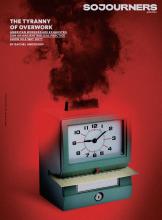NEARLY 1.4 BILLION Christians around the world receive their weekly exposure to the Bible through a lectionary. In the U.S., as many as 60 percent of Christians attend services in churches that follow a lectionary. For many Christians, this is their only regular exposure to our faith’s sacred narrative.
Even for those who love the ecumenical unifying energy of a common lectionary, we also acknowledge that the scripture snippets we hear on Sundays are chosen almost exclusively by Euro-Anglo male scholars, using Bible translations that reflect the same. (The translation committee for the 2011 Common English Bible was the first to include scholars of color.) It’s hard to embrace the Bible’s liberating power when you can’t find yourself in the story, and it’s even harder to show up when you learn you’ve been edited out of it.
Enter A Women’s Lectionary for the Whole Church, by Wilda C. Gafney, a professor of Hebrew Bible, offering not only an entirely new Christian lectionary but also rigorous and fresh Bible translations that restore women and feminine references to scripture, as well as text notes and preaching prompts—all in accessible language.
Read the Full Article

